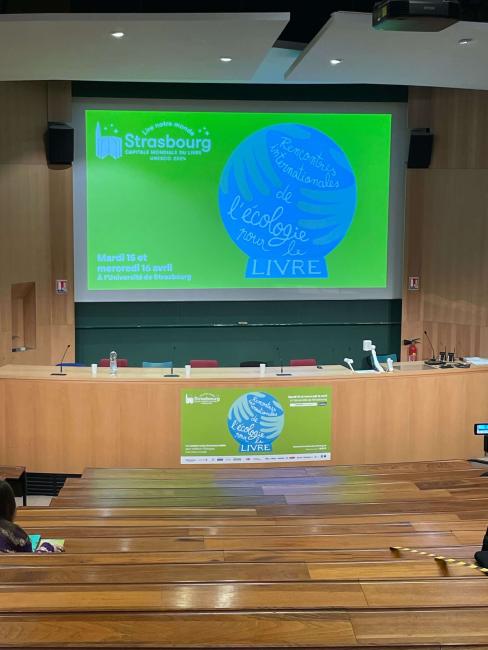
On this year’s World Book Day, follow our Policy Assistant, Lorenzo Dall’Omo, to UNESCO World Book Capital, Strasbourg, where he attended the Rencontres internationals de l’Ecologie pour le livre, a bookselling conference which aimed to explore the links between sustainability and the book chain. Keep reading to find out about Lorenzo’s impressions.
One week ago, on the 15th-16th of April, EIBF’s Policy Assistant Lorenzo Dall’Omo attended the Rencontres internationals de l’Ecologie pour le livre organized by the City of Strasbourg, the University of Strasbourg and the Région Grand Est (and in partnership with the Syndicat de la librairie française). The event, serving as a closure to Strasbourg’s tenure as UNESCO’s 2024 World Book Capital, broached a wide range of themes including an overview of the environmental challenges in the book sector, the different environmental impacts of print and digital books, and examples of best practices in the book sector to address sustainability challenges both from Europe and beyond.
The conference kicked off with a stark reminder: while the book sector is an ecosystem of its own, it is inseparable from the wider context in which we live and the issues we face across the globe. The devastating effects of climate change, which we are all privy to, are realities which we all must face.
Despite the daunting nature of these issues, we not only have the ability, but also the responsibility and capability, to kickstart a process of transformation, said Nadège Blond, Director of research at the Laboratoire image ville environnement of the University of Strasbourg. This process can be pursued through three avenues: exchange of best practices, co-construction through experimentation, and dissemination. Moreover, Fanny Valembois, sustainability consultant in the cultural sector and co-author of the EIBF commissioned study on the sustainability of the bookselling sector, especially stressed the importance of experimentation, and the space and freedom it ensures to best cater solutions to the idiosyncrasies of not just sectors, but different actors within those sectors.
Zooming in on the peculiarities of the book sector, what emerged during the conference is that the book chain is not exactly a circular one, as around 90% of it is based on the sale of new products, according to the panelists. While it is valid to pose questions on the carbon footprint of external elements of the book chain (such as transport), a central point of discussion should also be the overproduction of books, according to Anaïs Massola from the Association pour l’écologie du livre . For instance, in France, between 2000 and 2023, the production of new titles increased by 50%, reaching an average of 313 titles published every working day over the last three years (Actualitté). To confront this changing market reality and address the ever-increasing pace of production, the Association pour l'écologie du livre launched an initiative, La Trêve des nouveautés (the ‘Truce’ of new titles), targeting bookshops in France and Belgium. The main thrust of the initiative was to temporarily encourage booksellers to reduce or halt off-the-shelf purchases to offer bookshops a significant respite and encourage collective reflection on the dependence of independent bookshops and the book trade in general on the rapid flow of new titles. This initiative asks important questions for the future of the book chain and pushes us to think harder on our priorities and necessities.
In addition to these reflections, insightful perspectives also emerged during the conference when focusing on the bookselling reality beyond the usual confines of Europe. For example, when looking at francophone African countries, in many cases their school textbooks are still produced in France, diverting from the local ecosystem while also perpetuating problematic consequences when looking at sustainability and transport, as highlighted by Serge Dontchueng Kouam, former president of the Cameroonian Publishers and member of the Alliance internationale des éditeurs indépendants (The International Alliance of Independent Publishers - AIEI). The same often happens with literary works of fiction. Realities like these are important to underline that sustainability is not just a matter of environmentalism, but of equity and fairness. Thankfully, there are already examples to follow to address these persisting inequalities, such as the co-edition solidaires (solidary co-publishing) organized by a grant from the French book centre (Centre national du livre), a public body under the administrative supervision of the Ministry of Culture. The aim of this grant is to support foreign French-language publishing houses that, in partnership with publishing houses based in France, take on the economic risks involved in producing original French-language works that are of high quality, diversified and accessible to as many people as possible, in both fiction and non-fiction, said Laurence Hugues, director of the AIEI. Once again, the importance of collaboration proves to be crucial when facing interdisciplinary and complex challenges.
These are merely a few glimpses of what was discussed in Strasbourg over the two days. Despite the plethora of challenges and best practices, a clear consensus coalesced around one central tenet: no solution will ever come from working in a silo, as a concerted effort to transversally communicate across all parts of the book chain is fundamental in tackling complex, wicked’ problems (no book is an island!). From writers to publishers to booksellers, trust and dialogue is needed now more than ever when faced with urgencies of (seemingly) insurmountable proportions brought on by climate change.
Thank you to the organisers of the conference for two incredibly interesting and insightful days, and best of luck to the new UNESCO World Book Capital 2025: Rio de Janeiro!
